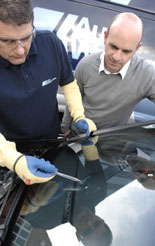CAR windscreens are getting bigger; curvier; extending attractively into the roof of cars to create a more aerodynamic exterior and an airier interior.
Add to this the the introduction of tints, heating, solar reflection and GPS technology and replacement costs have soared by as much as 68% in only 10 years – and businesses are footing the bill – says automotive glazing services provider Auto Windscreens.
Typical examples of the move by designers to use more glass in the cars they produce are: new Citroen C4 Picasso – 20% larger than that of the older model; new model Ford Mondeo windscreen – 59% more than previous models; VW Golf windscreen – 68% rise; and a BMW 5 Series screen – 50%.
“Windscreens of standard production cars are becoming increasingly sophisticated as designers seek to improve aerodynamic efficiency, driving comfort and safety, as well as appearance,” commented Nigel Davies, Auto Windscreens sales and marketing director.
“Unfortunately, this means it’s hitting the maintenance budgets of business car managers. However, costs can be managed by following these five action points,” added Mr Davies.
Tips to keep maintenance costs down
- Get chips repaired immediately – don’t let them become a costly crack
- Replace wiper blades every six months, to avoid damaged blades scratching your screen
- Top up your windscreen wash bottle regularly using screen wash not washing up liquid – it could leave a potentially dangerous film on your windscreen
- Always use a purpose-made ice scraper; anything else could scratch your windscreen
- Never pour boiling water or apply heat directly to frosted glass, it could cause it to crack
Further information
If you want to know what the legal position is on cracks or chips on the windscreen, read our Ask the experts What is the legislation on windscreen repair?.








